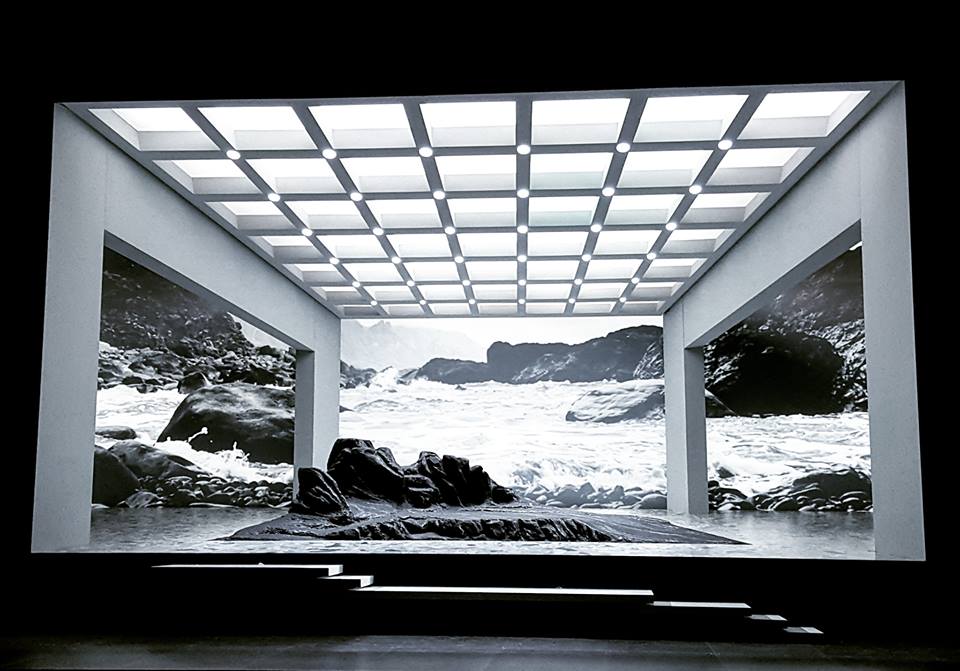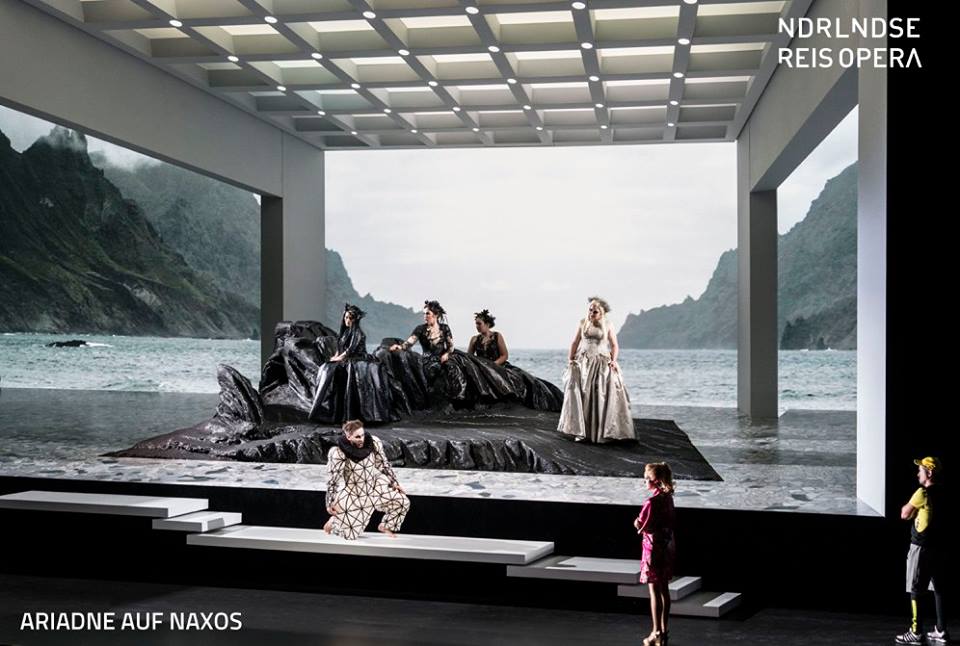The main auditorium of Enschede's Wilminktheatre is empty, as is the orchestra pit. On the immense stage the set for the prologue of Strauss' Ariadne auf Naxos. Theatre technicians discuss lighting and overhead cues, everyone looks relaxed. Including director Laurence Dale. It is four o'clock Friday afternoon, two weeks before the premiere on 10 September.
Earlier that Friday, the prologue - which covers almost half of the opera - was rehearsed with the entire cast. The next hour centres on a scene with Der Komponist and Zerbinetta, a scene that lasts less than eight minutes in the opera. Although this is a directorial rehearsal, conductor Antonino Fogliani also takes his place as Karin Strobos and Jennifer France take the stage.
Eye for detail
"Kindskopf! Merkt auf: wir spielen mit in dem Stück Ariadne auf Naxos. Das Stück geht so..."
Immediately Dale France interrupts, giving detailed instructions not only on where both singers should stand and how to move, but also on phrasing and tempo.
Six times this one phrase is sung again and, above all, acted out, as is virtually every phrase that follows. Meanwhile, while technicians do their work imperturbably, one notices how Fogliani closely follows Dale and takes notes in the score. And is very busy on his mobile phone.
"Did you think he was doing that?", Dale asks me later. When I confess, he shoots into laughter. "He has all these translation apps so he doesn't miss anything, that's why he looks at them all the time."
Not that this is necessary, as Dale himself switches from Dutch to English and Italian during the rehearsal. Always dead serious, but fortunately also with plenty of humour. He regularly uses comparisons with 'popular culture' to explain his intentions. When the scene has been gone through to perfection, both soloists ask to do it all over again one more time. And it works. After an hour, even without an orchestra, it sounds beautiful and looks impressive.
"Look, here come the dancers."
"Come, I'll show you the set," Dale says when everyone has left. We walk through the set that has many heights. Earlier, he showed that every place in the hall offers a different viewpoint. That is always the case, but here all sorts of things are happening on the sides too, so that to see everything you actually have to see the production several times. "Look, here come the dancers."
"The dance troupe of Zerbinetta? In the prologue?!"
"Yes, the whole prologue has been on stage."
"But they don't sing anything, do they?"
"Exactly, but they are there. And so we show that."
Once behind the backdrop, it turns out to be much less deep than it looks from the audience. Dale takes ten firm steps and grins. "Our Butterfly came to here."
He appears to enjoy talking about the Reisopera's previous productions. When I tell him that the mosaic on the floor reminds me of his Barber by Siviglia, Dale points out how easy it is to stick in there the crosses for the position of the soloists without anyone in the audience being able to see them.
Speech Falls
In the two hours that follow, Dale shows himself to be a real talker. He talks, besides about these Ariadne, also waxes eloquent about previous productions, some more successful than others, and reveals himself as a walking opera and directing encyclopaedia.
Not surprisingly, Dale may be mostly a director these days, but he also has an illustrious career as a singer. And conducting is something he is increasingly doing too.
That vast experience bore fruit, but also led to conflicts at times. For instance, his very first Ariadne no unmixed pleasure. "It was not well cast and the conductor insisted on sticking to a tradition that had crept in in the century since the premiere but which is not to be found in the score.
Von Karajan's famous recording comes up, included by record company EMI in 'great recordings of the century'.
"Terrible right? But everyone has it."
And indeed, I too have that recording at home.
"And? Do you ever listen to it?"
Singing, dancing, video
We meet in Sinopoli's recording. A live recording, I thought I remembered, but Dale corrects me and indicates right away what you can hear that from: "der Haushofmeister."
And he continues: "A role routinely performed by an older singer. Instead, we have a very young one. That immediately changes the dynamic between him and his employer. Strauss wrote it as a speaking role, but not plainly. The singing turns into talking and again into singing. Moreover, in our production, dance plays an important role. The singers also start dancing. And then after the interval we also have these wonderful video projections."
One new glorious work of art
We then get to talk about all the unusual couples in the opera: the composer and Zerbinetta; the tenor and soprano, who are mostly reminiscent of a bickering couple; the rich art collector with an obsession with Bacchus and his caretaker; and then, of course, Ariadne and Bacchus, who are central to the opera proper after the prologue. About the divine, the deliberately impossible stage directions of Strauss and his librettist Hugo von Hoffmannstahl, and about how that one scene I saw earlier in rehearsal is perhaps the key scene of the entire opera.
"Opera is often seen as a conflict between high and low culture, between the composer and the dance girl, but I don't see it that way. In the end, the coming together of those different cultures results in one new glorious work of art. This opera is not about conflict, but mainly about how totally different people come together.'
Who pays, decides?
A week later, Dale sends me a message: "We haven't even discussed the role of a Maecenas in Ariadne and about how that relates to State subsidies now - that too is in the prologue."
I reread the libretto, again finding new details and resisting the temptation to ask new questions. After the premiere, perhaps...


